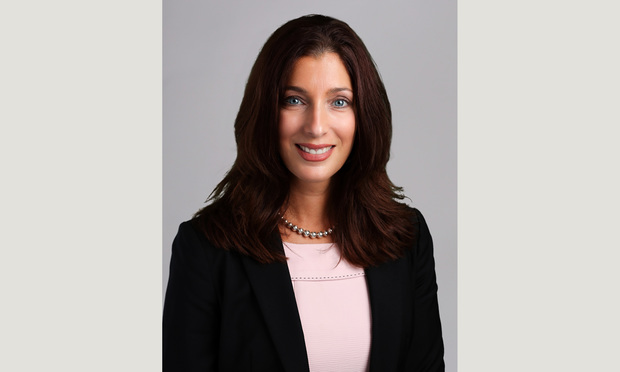Families First Coronavirus Response Act: The Likely Impact to Educational Institutions
As the coronavirus (COVID-19) spreads throughout the United States, the impact on student instruction, including big budget unknowns for public and private educational institutions, is daunting.
March 31, 2020 at 12:06 PM
4 minute read
 Maria Dwyer of Clark Hill.
Maria Dwyer of Clark Hill.As the coronavirus (COVID-19) spreads throughout the United States, the impact on student instruction, including big budget unknowns for public and private educational institutions, is daunting. Adding to this concern is the Families First Coronavirus Response Act (H.R. 6201) (the act) that was passed by the Senate and signed by the president on Wednesday, March 18, expands the protections under the Family Medical Leave Act (FMLA) and requires many private and all public educational institutions to provide significant amounts of paid leave related to COVID-19.
Emergency Family and Medical Leave Expansion Act
The Emergency Family and Medical Leave Expansion Act expands FMLA coverage for employees unable to work (or telework) due to the need to care for an employee's child who is under 18, because the child's school or daycare is closed or the childcare provider is unavailable due to COVID-19 related restrictions and closures. For private educational institutions, the EFMLEA exempts private institutions with over 500 employees and may exempt smaller institutions of fewer than 50 employees where it would "jeopardize the viability of the business as a going concern." Public educational institutions should be prepared to follow the requirements of the EFMLEA regardless of size. Employees need only be employed for 30 calendar days to be considered covered by the act.
The leave also provides the employee with continued health benefits and full restoration rights at the conclusion of the leave.
Emergency Paid Sick Leave Act
The Emergency Paid Sick Leave Act creates a new paid sick leave entitlement for workers affected by COVID-19 wherein the employee is subject to a legal quarantine or isolation order; the employee has been advised by a health care provider to self-quarantine; the employee is symptomatic and seeking a diagnosis; the employee is caring for a person described in reason 1 or 2; the employee is caring for a son or daughter whose school or day care is closed, or the child-care provider is unavailable due to COVID-19 precautions; or the employee is experiencing any other substantially similar condition specified by the Secretary of Health and Human Services (HHS). Private educational institutions with less than 500 employees and all public-sector educational institutions are covered. There is no minimum length of employment for eligibility.
Eligible full-time employees may be eligible for up to 80 hours of paid leave for a qualified reason. Part-time employees may take the number of hours that they work over a two-week period. The paid leave is available for immediate use.
Under both provisions of the act, retaliation is prohibited based on an employee's request for leave or participation in a complaint about a violation of the act.
Rate of Leave Pay
The EFMLEA requires covered employers to pay 2/3 of the employee's regular rate of pay, subject to caps, for up to 10 weeks, as the first 10 days may be unpaid. The paid sick leave requires pay of at least 2/3 of the regular rate up to the regular rate of pay, depending on the triggering event.
Under the act, private educational institutions will receive immediate tax relief through payroll deductions. Public educational institutions will likely not benefit from the tax relief because they are typically funded through state aid or other revenue and treated differently.
Next Steps for Educational Institutions
The act creates significant new financial and administrative obligations for educational employers during these difficult times. While the FMLA is not applicable to public educational institutions during periods of shutdowns, these institutions should be prepared to address these issues when their doors reopen. Public and covered private institutions should work with counsel to prepare policies and strategize regarding implementation of both new leave provisions. The law in this area is changing rapidly and tax credits, revenue sources, and even new leave provisions should be anticipated. The act will remain in effect through Dec. 31, unless extended by the Secretary of Labor.
Stay healthy. We will get through this together.
Maria Fracassa Dwyer is the member-in-charge of Clark Hill's Detroit office. She focuses her practice on employment defense litigation and counseling. Dwyer is a trusted adviser to senior management across a wide range of industries including public and private employers.
This content has been archived. It is available through our partners, LexisNexis® and Bloomberg Law.
To view this content, please continue to their sites.
Not a Lexis Subscriber?
Subscribe Now
Not a Bloomberg Law Subscriber?
Subscribe Now
NOT FOR REPRINT
© 2025 ALM Global, LLC, All Rights Reserved. Request academic re-use from www.copyright.com. All other uses, submit a request to [email protected]. For more information visit Asset & Logo Licensing.
You Might Like
View All
Pennsylvania Law Schools Are Seeing Double-Digit Boosts in 2025 Applications
5 minute read
Sanctioned Penn Law Professor Amy Wax Sues University, Alleging Discrimination
5 minute read
Pa. Superior Court: Sorority's Interview Notes Not Shielded From Discovery in Lawsuit Over Student's Death
3 minute read
LSAT Administrator Sues to Block AI Tutor From Using ‘Famous, Distinctive’ Test Prep Materials
3 minute readLaw Firms Mentioned
Trending Stories
- 1'Translate Across Disciplines': Paul Hastings’ New Tech Transactions Leader
- 2Milbank’s Revenue and Profits Surge Following Demand Increases Across the Board
- 3Fourth Quarter Growth in Demand and Worked Rates Coincided with Countercyclical Dip, New Report Indicates
- 4Public Notices/Calendars
- 5Monday Newspaper
Who Got The Work
J. Brugh Lower of Gibbons has entered an appearance for industrial equipment supplier Devco Corporation in a pending trademark infringement lawsuit. The suit, accusing the defendant of selling knock-off Graco products, was filed Dec. 18 in New Jersey District Court by Rivkin Radler on behalf of Graco Inc. and Graco Minnesota. The case, assigned to U.S. District Judge Zahid N. Quraishi, is 3:24-cv-11294, Graco Inc. et al v. Devco Corporation.
Who Got The Work
Rebecca Maller-Stein and Kent A. Yalowitz of Arnold & Porter Kaye Scholer have entered their appearances for Hanaco Venture Capital and its executives, Lior Prosor and David Frankel, in a pending securities lawsuit. The action, filed on Dec. 24 in New York Southern District Court by Zell, Aron & Co. on behalf of Goldeneye Advisors, accuses the defendants of negligently and fraudulently managing the plaintiff's $1 million investment. The case, assigned to U.S. District Judge Vernon S. Broderick, is 1:24-cv-09918, Goldeneye Advisors, LLC v. Hanaco Venture Capital, Ltd. et al.
Who Got The Work
Attorneys from A&O Shearman has stepped in as defense counsel for Toronto-Dominion Bank and other defendants in a pending securities class action. The suit, filed Dec. 11 in New York Southern District Court by Bleichmar Fonti & Auld, accuses the defendants of concealing the bank's 'pervasive' deficiencies in regards to its compliance with the Bank Secrecy Act and the quality of its anti-money laundering controls. The case, assigned to U.S. District Judge Arun Subramanian, is 1:24-cv-09445, Gonzalez v. The Toronto-Dominion Bank et al.
Who Got The Work
Crown Castle International, a Pennsylvania company providing shared communications infrastructure, has turned to Luke D. Wolf of Gordon Rees Scully Mansukhani to fend off a pending breach-of-contract lawsuit. The court action, filed Nov. 25 in Michigan Eastern District Court by Hooper Hathaway PC on behalf of The Town Residences LLC, accuses Crown Castle of failing to transfer approximately $30,000 in utility payments from T-Mobile in breach of a roof-top lease and assignment agreement. The case, assigned to U.S. District Judge Susan K. Declercq, is 2:24-cv-13131, The Town Residences LLC v. T-Mobile US, Inc. et al.
Who Got The Work
Wilfred P. Coronato and Daniel M. Schwartz of McCarter & English have stepped in as defense counsel to Electrolux Home Products Inc. in a pending product liability lawsuit. The court action, filed Nov. 26 in New York Eastern District Court by Poulos Lopiccolo PC and Nagel Rice LLP on behalf of David Stern, alleges that the defendant's refrigerators’ drawers and shelving repeatedly break and fall apart within months after purchase. The case, assigned to U.S. District Judge Joan M. Azrack, is 2:24-cv-08204, Stern v. Electrolux Home Products, Inc.
Featured Firms
Law Offices of Gary Martin Hays & Associates, P.C.
(470) 294-1674
Law Offices of Mark E. Salomone
(857) 444-6468
Smith & Hassler
(713) 739-1250





